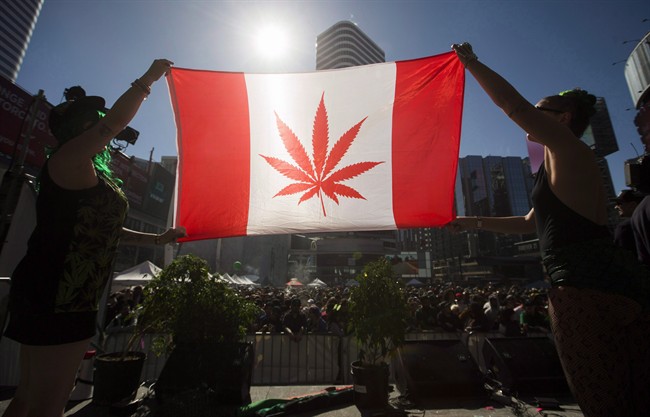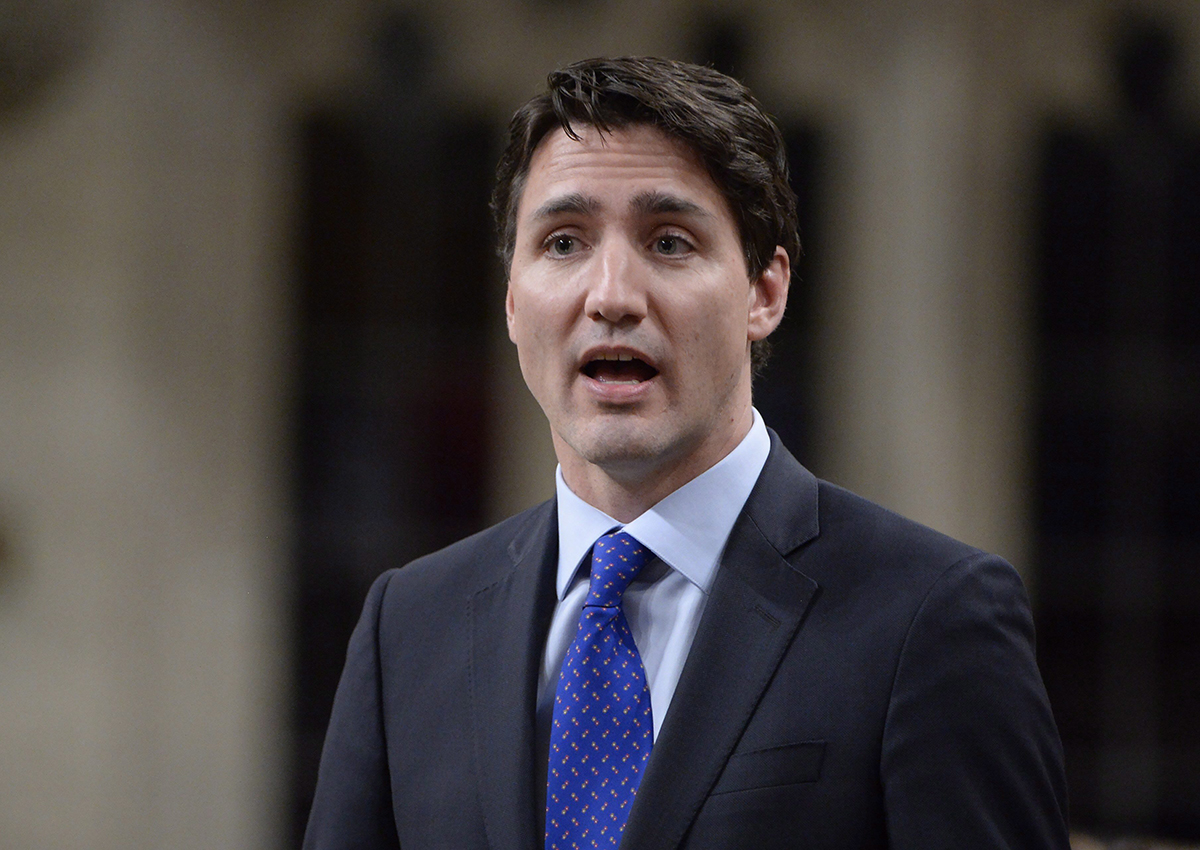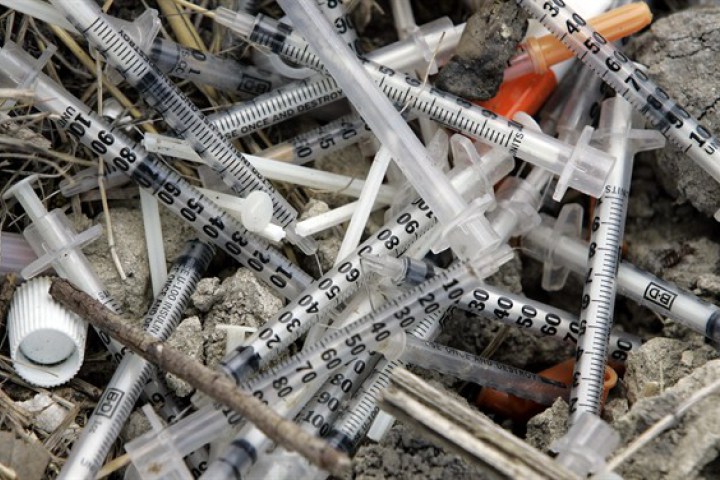Canada is on course to legalize marijuana by the summer of 2018.

Legislation introduced on Thursday by the federal Liberal government would restrict small pot purchases for personal use to adults aged 18 or older. It would also make selling weed to minors a new— and serious — criminal offence.
It’s a move that comes after over 20 years of efforts to change Canadian attitudes toward addiction and illegal substances, from a focus on law enforcement, to a focus on health.
But with an overdose crisis raging across the country, Donald MacPherson, executive director of the Canadian Drug Policy Coalition (CDPC), believes Canada could go further.
“There is a strong and persuasive case to be made for legal regulation of all drugs,” he said in a recent brief.
But MacPherson and other experts think the feds should do more than just legalize illicit substances.
The Trudeau government’s move to legalize pot comes after decades of calls to revise Canada’s drug laws.
One of the earliest and most prominent calls came from Vince Cain, who served as B.C.’s chief coroner in the 1990s.
At the time, Vancouver was coping with an overdose crisis not unlike the one it’s facing right now.
READ MORE: Fentanyl overdoses killed hundreds of Canadians this year, experts say 2017 could be deadlier
Heroin, not fentanyl, was the scourge of the day.
Fatal overdoses in B.C. had climbed from 39 in 1988 to 331 in 1993. In the City of Vancouver alone, illicit drug deaths had grown from 18 in 1988, to 91 in 1992, to 200 in 1993.
Drug use became the most common cause of death for B.C. men and women aged 30 to 34. Heroin was identified in 90 per cent of cases, according to the 2009 book A Thousand Dreams: Vancouver’s Downtown Eastside and the Fight for its Future.
And the crisis wasn’t just hitting the drug-ridden Downtown Eastside. Lawyers, doctors and people in affluent neighbourhoods were dying too.
The crisis grew so serious that Cain struck a task force to examine drug addiction at a deeper level.
In September 1994, he released a report that recast overdose deaths as a health problem, not one of law enforcement.
He called the war on drugs an “expensive failure” and said that jailing addicts only subjected them to a “merry-go-round” of “arrest, detention, parole and relapse.”
In a section that was controversial at the time, he recommended the decriminalization of possession of “soft” and “hard” drugs, and said their attendant issues should be addressed through a “medical model, not a criminal model.”
READ MORE: Liberals, NDP try to expedite bill to help combat opioid crisis
- Iran fires air defences at military base after suspected Israeli drone attack
- U.S. aid to Ukraine, Israel set to pass. But bills differ in one key area
- Carbon rebate labelling in bank deposits fuelling confusion, minister says
- Conservatives ask interference inquiry judge to rule elections were flawed
Cain was among the first officials to make such a recommendation, but he was far from the last.
In subsequent years, similar calls would come from politicians, from public health organizations, from chief medical health officers.
And over time, rhetoric shifted from decriminalization – which often involves relaxing enforcement of drug laws – to outright legalization, which involves taxing and regulating illicit substances.
In 2005, the City of Vancouver called on the federal government to look at “regulatory alternatives to the policy of prohibition for currently illegal drugs.
In 2011, the Health Officers Council of British Columbia said drug regulation oriented around public health could help to “reduce the health, social and fiscal harms associated with all psychoactive substances.”
And in one of the more recent calls to action, this came from Patricia Daly, chief medical health officer at Vancouver Coastal Health:
“Most public health physicians believe that the best way to decrease the harms associated with any psychoactive substances … is they should all be legal but very strictly regulated.”
The shift from decriminalization to legalization is also evident in two of the Canadian Drug Policy Coalition’s reports.
In 2013, the organization released a 112-page report that called for “decriminalization of all drugs for personal use and the creation of a regulatory system for adult cannabis use.”
Four years later, the CDPC changed its tune in a brief to a Senate committee, when it made the case for legalizing drugs.
“Like the current situation with cannabis, markets for other illegal drugs have also existed for many years and will continue to exist in the absence of strict regulatory oversight and market management,” it said.
Those remarks came amid an overdose crisis that killed hundreds across Canada last year, and is expected to kill more in 2017.
Drug overdoses killed 914 people in B.C. alone in 2016, 80 per cent more than they did in 2015.
There were 142 overdose deaths in December – the most ever recorded in a single month.
Drug overdoses were more likely to kill B.C. residents last year than Alzheimer’s, liver disease or suicide.
READ MORE: Drug overdose among the top 10 causes of death in B.C.
The crisis has shifted talk to focus on legalization instead of decriminalization, MacPherson told Global News.
“The opioid crisis has really accelerated thinking on the issue of legalization of all drugs,” he said.
“Fentanyl has come along and you hear calls for legalization from all sorts of people now, from family groups, from physicians, medical health officers.
“There’s this notion that the well has been poisoned and it’s time to take control of the supply.”
The case of Portugal
Portugal is one of the examples cited most often in arguments supporting legalization.
The country decriminalized all drugs in 2001, changing possession from a criminal to an administrative offence – possessing drugs would be punished with a fine, rather than a prison sentence.
The move came in response to a drug crisis that saw as many as 100,000 people using heroin, MacPherson said.
“One per cent of their population was using heroin,” he said.
Results of the move are evident in the country’s overdose death rates. In 2014, Portugal’s rate had fallen to 4.5 deaths for people aged 15 to 64 years old, per million population.
That was among the lowest rates in Europe, topping only Romania (2.4), Bulgaria (3.1), Slovakia (3.1), and Hungary (3.4), according to the European Monitoring Centre for Drugs and Drug Addiction (EMCDDA).
It was also below the most recent European average of 19.2 deaths per million for that age group.
Portugal has also seen fewer people injecting drugs and use is falling among 15- to 24-year-olds since it decriminalized illicit substances, said the CDPC’s 2013 report.
But Portugal hasn’t achieved these results through decriminalization alone. The country has also set up a system whereby people caught using in public can be evaluated and referred to treatment, MacPherson said.
The system works like this: a drug user caught consuming substances by a police officers will, instead of being arrested, be referred to a “dissuasion committee.”
Here, the user is asked questions about matters such as their housing, their income, their health and whether they wish to go to treatment. They can then be connected to health, social and legal services — even social assistance.
READ MORE: 9 overdose deaths in one night prompt officials in Vancouver to demand more treatment
“It’s really an attempt to connect the individual with the system,” MacPherson said.
“So the system gets to have a conversation with the individual.”
Supports like these have been key to Portugal’s success with drugs, MacPherson said.
The country doesn’t have an overdose crisis like Canada does, he noted.
“Police aren’t chasing people just because they’re using … They’re stopping them if it’s in public, in your face.”
Canada, meanwhile, doesn’t have such a system in place, MacPherson said.
A system like this should go “hand in hand” with legalization, he said – not one before the other, or conditional upon the other, he added.
“I think it’s a bit of a mug’s game to say we can’t legalize or do anything on the legal side until we have the perfect system,” MacPherson said.
“That means it’ll never happen.”
The detractors
Talk of legalizing drugs nevertheless has its detractors.
One of them is Joseph A. Califano Jr., former U.S. secretary of health, education and welfare, and the founder of the National Center on Addiction and Substance Abuse at Columbia University.
In 2007, he wrote an article for the BMJ (formerly the British Medical Journal) that argued against legalization.
He took the view that addiction should not be seen as a “moral failing” or an “easily abandoned act of self-indulgence.”
“The medical profession and the public health community should educate society that addiction is a complex physical, psychological, emotional and spiritual disease,” he wrote.
But he also argued that legalization isn’t a solution. He said such measures would make illegal drugs cheaper, easier to obtain and more acceptable to use.”
To boost his argument he raised the example of Platzspitz, a park in Zurich, Switzerland where authorities once tolerated drug activity as a form of containment, The New York Times reported.
The city provided addicts there with clean syringes and access to health officials, starting in 1987.
At that time, the park only drew hundreds of addicts.
Years later, the number of regular users in the area had swelled to as many as 20,000, almost a quarter coming from other countries, the Times noted.
Violence grew, and the number of drug-related deaths at Platzspitz hit 81 in 1991, double what it was in 1990.
The experiment was shut down in 1992.
READ MORE: Canadian police look for guidance on marijuana legislation
“Legalization and decriminalization — policies certain to increase illegal drug availability and use among our children — hardly qualify as public health approaches,” Califano wrote.
He didn’t return a request for comment to Global News.

David Berner, the Vancouver-based director of the Drug Prevention Network of Canada and the founder of the X-Kalay Foundation Society, a residential treatment centre for alcoholics and drug addicts, is similarly opposed to legalization.
Berner rejects a number of arguments in favour of the idea — among them, that it could take away the proceeds of crime.
“Criminals are endlessly creative, they’re endlessly inventive,” he told Global News.
“They’re still going to make lots of money out of marijuana. They’re going to make better marijuana, faster marijuana, and lots and lots of people will be happy simply for the subcriminal cheesy thrill of dealing with the underground.”
Berner is even less sympathetic to one of the arguments that the CDPC put forward in its 2013 report: that people who use illegal drugs face discrimination and hostility.
The CDPC called for “evidence-based approaches to eliminate stigma and discrimination.”
Berner’s response?
“The stigma issue is such a red herring,” he said. “It’s such a preposterous bunch of nonsense.”
READ MORE: Here’s why Canadian researchers think a protein might help prevent drug addiction — in mice
Berner likened concerns about stigma to “political correctness,” saying, “we have a sickness of political correctness in culture and and this is one of them, where you’re not supposed to say anything un-nice to anybody.”
He said drug addiction isn’t an issue you can sugarcoat when “people are dying on the street.”
Just as MacPherson argues that legalization should happen alongside supports for drug users, some say that Canada’s effort to legalize pot doesn’t go far enough in its current form.
Dr. Louis Francescutti is one of them.
A professor in the University of Alberta School of Public Health and former president of the Canadian Medical Association (CMA), he generated controversy with his comments on medical marijuana in 2014.

At the time, he said it’s “just plain bad medicine to prescribe a product when we don’t know how it works, we don’t know when it works, who it works for, how it interacts or how much to prescribe,” the Canadian Medical Association Journal reported.
His comments largely reflected the CMA’s position: that there is “insufficient scientific evidence available to support the use of marijuana for clinical purposes.”
Today, however, Francescutti strikes a different note on marijuana.
He’s indifferent about whether the federal government decides to legalize it or not. But if they do, he wants to ensure that any revenues go to the right place.
“I don’t care quite frankly what they do as long as they make absolutely sure that any increased taxation that comes as a result of sales of marijuana products are directed immediately toward mental illness and addiction services,” he told Global News.
Francescutti said he hasn’t heard any such commitment from the governing Liberals.
Thursday’s announcement contained no details on how cannabis would be taxed, nor where revenue would go.
However, two years ago, Prime Minister Justin Trudeau did say that any cash coming through taxation of marijuana would go to addiction treatment, mental health supports and education programs.
READ MORE: Trudeau says tax on legalized pot won’t be a government cash cow
The legislation announced on Thursday has a long way to go before it becomes law.
One point is clear right now: on marijuana – indeed, on all drugs – experts hope the federal government will do more than just legalize them.














Comments